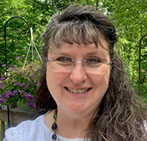Summary
In this episode, Salme Lavigne, scientific editor of the Canadian Journal of Dental Hygiene (CJDH),
interviews Tammy Marshall-Paquin, lead author of a recently published article on knowledge, attitudes, and
willingness of oral health professionals to treat transgender clients. Learn about Tammy’s experience with
the
peer-review and publication process, and how disparities in medical and oral health care affect transgender
individuals.
Read Tammy’s article to learn
more about the importance of culturally competent oral health care.
Practical Implications for Dental Hygienists:
- Increasing awareness of the discrimination, stigma, and biases that transgender individuals experience
in
society may reduce the likelihood of perpetuating these behaviours when providing oral health care.
- Oral health professionals should recognize that their lack of knowledge and own personal beliefs may
produce
behaviours that are perceived as discriminatory or biased by transgender patients.
- Continuing education on how to provide culturally competent care to the transgender population would be
beneficial for all oral health professionals.
Also, browse past issues of CJDH for research on
similar
topics. Individual journal articles can be easily viewed, downloaded, and printed.
For CDHA members to receive a certificate of completion for this learning activity, click the Access Now
button
and complete the curriculum. After responding to a feedback survey, your certificate will be available in
your
online CDHA profile.
Learning Outcomes
Following the learning activity, participants will be able to:
- Identify areas of their dental hygiene practice requiring improvement
- Use knowledge sources to inform dental hygiene practice and enhance service provision
- Reflect on challenges of applying new scientific research to practice
Format for Learning
The recorded interview is available in English with French closed captioning. The research article is
available in English and French.
The interview is approximately 15 minutes in length; access to the accompanying research article is
provided along with a set of self-reflection questions. The learning is self-directed and the article
can be downloaded and printed. The self-reflection questions must be completed prior to receiving a
certificate of completion. It is expected that viewing the recording, reading the article, and answering
the questions will take you at least 1 hour.
A certificate of completion will be provided. After watching the video, reading the article, answering
the questions, and responding to a feedback survey, you can access a certificate of completion from your
online CDHA profile.
Speakers

Tammy L Marshall-Paquin, MSDH, RDH, MAADH
Tammy Marshall-Paquin has been a dental hygienist for over 34 years. She completed her master’s
degree in
dental hygiene at MCPHS University in Boston, where she was a clinical faculty member before
accepting
an opportunity to edit and revise the ancillary materials for Wilkins’ Clinical Practice of the
Dental
Hygienist, 14th edition. Tammy currently works as a public health dental hygienist and manages
the
dental division of HealthHub, a growing non-profit focused on increasing access to care for
underserved
communities via mobile facilities in rural Vermont. “Smiles are universal, no matter what
language you
speak. I love helping people find their smiles again,” Tammy says. She has three grown sons and
a new
daughter-in-law, loves hiking, biking, gardening, and all things outdoors.

Salme Lavigne, PhD, RDH
Salme Lavigne was appointed scientific editor of the Canadian Journal of Dental Hygiene,
effective
December 1, 2015. She
holds a diploma in dental hygiene from the University of Toronto, a bachelor’s degree in
biomedical
anthropology from
Lakehead University, a master’s degree in dental hygiene education from the University of
Missouri-Kansas
City, and a
doctorate in community health sciences from the University of Manitoba. Salme was the founding
director
of
the dental
hygiene program at Confederation College, Thunder Bay, and served as director of the School of
Dental
Hygiene,
University of Manitoba, for 13 years where she developed and initiated the first BScDH program
at that
institution. An
internationally recognized researcher and educator, Salme has received Alumni of Distinction
awards from
the
University
of Toronto and the UMKC School of Dentistry, and a Life Membership Award from the Canadian
Dental
Hygienists
Association.